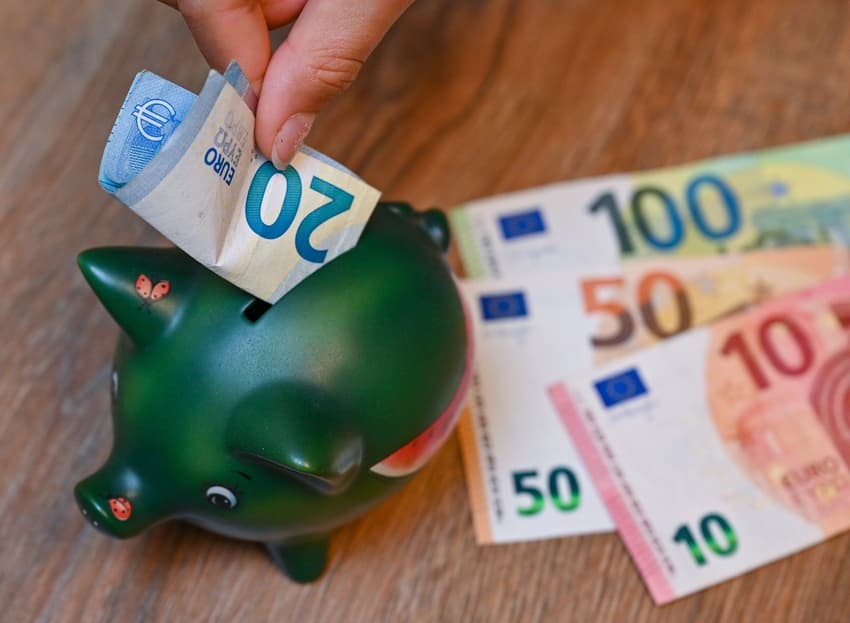In stats: Germans among the biggest money savers in the world

Despite high inflation, Germans are managing to stash away over a tenth of their disposable income each month, according to figures published on Tuesday from Germany's Statistical Office.
The figures show that people in Germany stashed away about as much in the first half of 2023 as they did in the same period last year.
The savings quota was 11.3 percent, meaning that for every €100 of disposable income, an average of €11.30 was saved. On average, each person put away €260 per month.
The rate was around six percentage points higher in the first half of the pandemic years 2020 and 2021.
During this period, many people had more money left over than in normal times, since for example holiday trips were cancelled and leisure facilities were temporarily closed.
There are, however, clear differences between households depending on their income level and living situation.
While some were still able to put a lot of cash aside, others had nothing left at the end of the month, "which is likely to have been exacerbated for many people due to the continuing high price increases for everyday goods".
READ ALSO: Ask an expert: Why is cash still so popular in Germany - and is it changing?
Compared to other industrialised countries, people in Germany put aside an above-average amount in 2022.
In Italy, for example, the savings quota was 2.1 percent, in the US 3.7 percent, in Japan 5.4 percent and in Austria 8.8 percent, according to the Organisation for Economic Co-operation and Development (OECD).
Only two countries had a higher rate, Switzerland with 18.4 percent and the Netherlands at 12.7 percent.
How Germans are cutting back on their spending
While only one in five Germans does not feel in the position to put money away, this number is steadily increasing, according to another survey published Tuesday by ‘Wealth Index’ of the German Sparkasse (DSGV).
Since 2021, the proportion of non-savers has risen from 15 to 20 percent. The survey shows that people in Germany are feeling the effects of the global political situation, said DSGV President Helmut Schleweis in Berlin.
"Many simply need more money at the moment to cover their everyday needs,” they wrote.
According to the survey, Germans are saving the most on their daily shopping, when going to restaurants or on holidays, with 61 percent saying that they had cut back on their consumption in the past twelve months - or the highest amount since the Wealth Index was first published in 2005.
READ ALSO: EXPLAINED: How to save money on your groceries in Germany
Comments
See Also
The figures show that people in Germany stashed away about as much in the first half of 2023 as they did in the same period last year.
The savings quota was 11.3 percent, meaning that for every €100 of disposable income, an average of €11.30 was saved. On average, each person put away €260 per month.
The rate was around six percentage points higher in the first half of the pandemic years 2020 and 2021.
During this period, many people had more money left over than in normal times, since for example holiday trips were cancelled and leisure facilities were temporarily closed.
There are, however, clear differences between households depending on their income level and living situation.
While some were still able to put a lot of cash aside, others had nothing left at the end of the month, "which is likely to have been exacerbated for many people due to the continuing high price increases for everyday goods".
READ ALSO: Ask an expert: Why is cash still so popular in Germany - and is it changing?
Compared to other industrialised countries, people in Germany put aside an above-average amount in 2022.
In Italy, for example, the savings quota was 2.1 percent, in the US 3.7 percent, in Japan 5.4 percent and in Austria 8.8 percent, according to the Organisation for Economic Co-operation and Development (OECD).
Only two countries had a higher rate, Switzerland with 18.4 percent and the Netherlands at 12.7 percent.
How Germans are cutting back on their spending
While only one in five Germans does not feel in the position to put money away, this number is steadily increasing, according to another survey published Tuesday by ‘Wealth Index’ of the German Sparkasse (DSGV).
Since 2021, the proportion of non-savers has risen from 15 to 20 percent. The survey shows that people in Germany are feeling the effects of the global political situation, said DSGV President Helmut Schleweis in Berlin.
"Many simply need more money at the moment to cover their everyday needs,” they wrote.
According to the survey, Germans are saving the most on their daily shopping, when going to restaurants or on holidays, with 61 percent saying that they had cut back on their consumption in the past twelve months - or the highest amount since the Wealth Index was first published in 2005.
READ ALSO: EXPLAINED: How to save money on your groceries in Germany
Join the conversation in our comments section below. Share your own views and experience and if you have a question or suggestion for our journalists then email us at [email protected].
Please keep comments civil, constructive and on topic – and make sure to read our terms of use before getting involved.
Please log in here to leave a comment.